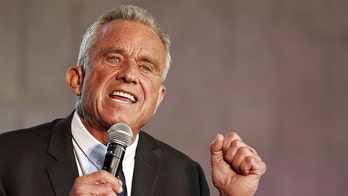A high-ranking official in the Susan G. Komen for the Cure breast-cancer charity quit Tuesday, offering a defiant letter of resignation detailing the organization's decision about whether it should continue funding breast cancer screenings at Planned Parenthood.
Karen Handel, the charity's vice president for public policy, told Komen officials that she supported the move to cut off funding for Planned Parenthood. She said the discussion started before she arrived at the organization and was approved at the highest levels of the charity.
In an interview with Fox News, Handel called "just absurd" the notion that she was the sole authority behind the decision.
"The process was vetted, the policies were vetted at all the appropriate levels of the organization," she said.
Handel said she resigned because she had become "too much of a focal point," and wanted the group to "refocus" on its mission. And she blasted Planned Parenthood, implicating them in a "vicious attack against a great organization."
"I am deeply disappointed by the gross mischaracterizations of the strategy, its rationale, and my involvement in it," Handel said in her letter. "I openly acknowledge my role in the matter and continue to believe our decision was the best one for Komen's future and the women we serve."
Handel had supported a decision that Komen announced last week to exclude Planned Parenthood, which provides a range of women's health care services including abortions, from future grants for breast-cancer screenings because it was under government investigation. The charity cited a probe launched by a Florida congressman at the urging of anti-abortion groups.
The breast cancer charity reversed course after its decision created a three-day firestorm of criticism. Members of Congress and Komen affiliates accused the group's national leadership of bending to pressure from anti-abortion activists. Komen's founder and CEO, Nancy Brinker, denied the decision was driven by pressure from anti-abortion groups.
Until Tuesday, Handel had publicly kept silent about her role in the dispute. Handel said Komen's decision to change "its granting strategy and exit the controversy surrounding Planned Parenthood and its grants was fully vetted by every appropriate level within the organization."
She added that while the decision was reviewed by the Komen board of directors in November, the plan to update its policies preceded her April 2011 arrival at the organization.
"The controversy related to Planned Parenthood has long been a concern to the organization," she wrote.
"As you will recall, the board specifically discussed various issues, including the need to protect our mission by ensuring we were not distracted or negatively affected by any other organization’s real or perceived challenges. No objections were made to moving forward," she wrote, adding that the changes were not based on anyone's political beliefs or ideology.
However, a source with direct knowledge of decision-making at Komen's headquarters in Dallas said the grant-making criteria were adopted with the deliberate intention of targeting Planned Parenthood.
The criteria's impact on Planned Parenthood and its status as the focus of government investigations were highlighted in a memo distributed to Komen affiliates in December.
According to the source, who spoke on condition of anonymity for fear of repercussions, a driving force behind the move was Handel, who was hired by Komen last year as vice president for public policy after losing a campaign for governor in Georgia in which she stressed her anti-abortion views and frequently denounced Planned Parenthood.
Brinker has said Handel didn't have a significant role in the policy change, and she issued a brief statement acknowledging Handel's resignation.
"We have made mistakes in how we have handled recent decisions and take full accountability for what has resulted, but we cannot take our eye off the ball when it comes to our mission. To do this effectively, we must learn from what we've done right, what we've done wrong and achieve our goal for the millions of women who rely on us," she said.
"I have known Karen for many years, and we both share a common commitment to our organization's lifelong mission, which must always remain our sole focus. I wish her the best in future endeavors,' Brinker added.
Komen, which reportedly gave $680,000 to Planned Parenthood in 2011, "clearly bowed to the pressure" of the abortion rights groups, said Colin Hanna , president of the Pennsylvania Pastors' Network and Let Freedom Ring. "It is sad to think that when people around the country walk for breast cancer research, give their money to a fundraiser or wear a pink ribbon, they are also giving their money to an organization that takes the lives of unborn children every day."
Handel, a Republican, ran for Georgia governor in 2010, winning an endorsement from former vice presidential candidate and Alaska Gov. Sarah Palin. Handel then lost a primary runoff to former Georgia Congressman Nathan Deal, who won the general election.
Throughout the campaign, Deal accused Handel of being soft on abortion.
Deal repeatedly attacked Handel over a 2005 vote she took while serving on a metro Atlanta county commission to give more than $400,000 to Planned Parenthood, though not for abortion services. The Georgia affiliate of Planned Parenthood said the money went to a downtown clinic for services such as cervical cancer screenings, testing for sexually transmitted diseases and birth controls.
A longstanding law bans using federal money to pay for abortions except in cases of rape, incest or to protect the health of the mother.
The Associated Press contributed to this report.





